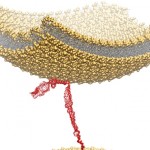Scientists have discovered how Parkinson’s disease spreads through the brain – a breakthrough that could lead to new drugs for the devastating illness.
It is the first time the protein that causes the incurable condition has been linked to mutations in the key gene behind it, shedding fresh light on its progression and symptoms.
Parkinson’s is the second most common neurological condition, after Alzheimer’s, affecting about one in 500 people. Variants in a gene called GBA1 increase the risk up to 30 times.
In the study researchers studied stem and brain cells created from the skin of two groups of participants – one with Parkinson’s who were all carrying the mutation and the other healthy controls.
They found the GBA1 mutation creates problems with how proteins, in particular alpha-synuclein, are processed and recycled in cells. When someone has the mutation this does not work properly, creating a build-up of alpha synuclein, which is released into the brain – contributing to the spread of Parkinson’s.
In patients a-synuclein becomes misshapen and stacks together to form long, toxic fibrils which kill the neurons, causing Parkinson’s.
Symptoms emerge when around 70 percent of cells have been lost in the part of the brain called the substantia nigra. These can include a tremor, slowness of walking and stiffness. When the progressive condition spreads to other areas of the brain, Parkinson’s dementia and cognitive problems develop.
 The new findings published in Stem Cell Reports offer an insight into how and why excess alpha-synuclein is released into the brain.
The new findings published in Stem Cell Reports offer an insight into how and why excess alpha-synuclein is released into the brain.
It opens up new pathways of investigation into targeting treatments that could stop this process – with the goal of halting or minimising the severity of the condition.
Professor Richard Wade-Martins, head of the Oxford Parkinson’s Disease Centre, said: “Our brain cells work like a complex manufacturing unit, building new proteins to carry out activities and recycling proteins that get damaged.
“We already know Parkinson’s may spread when alpha-synuclein escapes from affected cells into the brain, where it can then get taken up by other cells. Thanks to this study, for the first time we know how the protein is released, giving us new clues on how this spread happens.
“Most importantly, these findings open up new avenues into investigating potential new therapies or treatments that could stop the spread of alpha-synuclein and slow the condition’s progression.”
Parkinson’s affects 127,000 people in the UK alone. Famous sufferers include Michael J Fox and Mohammed Ali.
Dr Arthur Roach, director of research at the charity Parkinson’s UK which funded the study, said: “People with Parkinson’s and their families are living with the constant uncertainty of how the condition will affect them both mentally and physically in the future.
“In addition to the well known problems with movement and balance, up to 80 percent of people with Parkinson’s will go on to develop dementia, affecting their ability to reason and plan as well as their concentration, attention, memory and language.”
He added: “This study is a good example of how studying a genetic form of the condition can provide important insights into what is thought to be a fundamental feature of all forms of Parkinson’s.
“These findings offer new ideas on how we could stop the condition in its tracks – changing the lives of the 127,000 people in the UK, and seven million worldwide, living with Parkinson’s.”
By Mark Waghorn





